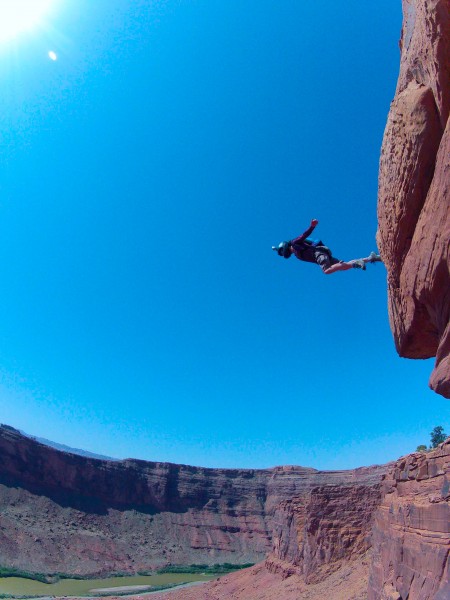Following Up on Fear
- May 2012
- Uncategorized
 Steph,
Steph,
A while back you answered an e-mail I had sent you about fear and I began to recently contemplate how you know where you limit is? I seem to struggle with knowing when it is safe to tame my fear and when the fear is healthy and I should cater to it. Your segment in the Sharp End where you free-soloed the Castleton North Face led me to wonder where my limit is…how do you know when to tame your fear and when to listen to it?
Erin
Hi Erin,
I’ve always wondered about listening to fear versus being controlled by fear too. The best way for me to learn is through personal experience. For many years I used to force myself through fear, thinking that was better than being stopped by it. In normal rock climbing situations, that was really the right approach and worked well. It’s kind of like standing on a high dive board and being really scared to jump: you just make yourself do it and then you end up in the water and it’s all fine. A lot of times it’s like that with taking falls in climbing–it seems so scary and terrible, but usually it’s perfectly safe and so you should be pushing yourself. This is more like stress or nerves. If you always give in to stress and anxiety, you will never progress.
However, if you develop the habit of always forcing through anxiety and fear, you may gradually find yourself developing the opposite problem, of taking it too far. If you take it too far in that direction, you are still being controlled by fear, because now it’s making you do things you shouldn’t do, rather than stopping you from doing things you should do. I see tons of people, myself included, making the mistake of being controlled by fear in either direction. Both are bad for you as an evolved human, and the second one can be deadly.
Where this gets dangerous is when you are in situations that are more high risk. What I’ve learned through free soloing and climbing in the mountains is that you need to listen to fear–mainly because if you are completely gripped by fear, you will not perform as well as you need to perform to be safe. If all the fundamentals are in place: you are completely prepared physically, mentally and emotionally, and you are still clenched by fear, something is wrong. Something may be off: conditions may not be right, you may be overlooking something, or you simply may not be as truly ready as you thought. This isn’t the same thing as being totally nervous. But what I’ve learned through personal mistake is that if you’re too scared and you go for it anyway, you will most likely do a bad job and get hurt or have a close call, or at least an unpleasant experience. And in evaluating things after the fact, you’ll most likely come up with at least 2-3 things that actually weren’t right and should have been enough reason to back off.
It’s not a simple thing, and there’s not a simple answer. But what I would say is think about listening to fear, as much as you would listen to any other element such as fatigue, wind, darkness, cold, rather than being controlled by it like a puppet. With evaluating fear, you also need to be extremely objective with yourself and where you are. The more you can separate yourself from emotional response, the more you can be sure of having an intelligent perspective, because fear is perhaps the ultimate emotion.
Steph








Steph, that is very well explained! Thank you.
That explains alot of things…Good post and thanks:)
Great post Steph! Been thinking about this after taking my first ground fall yesterday (from not very high, fortunately). I was surprised at how not scared I was while it happened given that falling is always so terrifying in your head.
You were kind enough to respond on the website to an email I sent you a while back–just wanted to say thank you again 🙂 Take care!
I’m glad it worked out 🙂